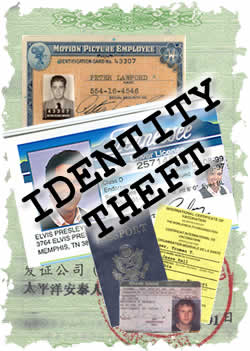
How can someone steal your identity? They use your name, Social Security number, credit card number, or other personal information to commit fraud or theft. They might:
- Run up charges on your credit card accounts,
- Open new credit accounts or cellular phone service using your name, or
- Open a bank account in your name and write bad checks on it.
Problems that result, such as unpaid bills, are reported on your credit report. See Credit Reports and Scores.
You can reduce the chance a con artist can go on a spending spree with your money or steal your identify by taking these precautions:
- Give your Social Security number only when absolutely necessary. Ask to use other types of identifiers when possible. If your state uses your SSN as your driver's license number, ask to substitute another number.
- Sign credit/debit cards when they arrive. No one can forge your signature and use them.
- Carry only the cards you need. Extra cards increase your risk and your hassle if your wallet is stolen.
- Keep your PIN numbers a secret. Never write a PIN on a credit/debit card or on a slip of paper kept with your card.
- Avoid obvious passwords. Avoid easy-to-find names and numbers like your birthday and phone number.
- Store personal information in a safe place. Lock up your drivers license and other cards at home and at work.
- Don't give card numbers to strangers. Confirm whether a person represents a company by calling the phone number on your account statement or in the telephone book.
- Watch out for shoulder surfers. Use your free hand to shield the keypad when using pay phones and ATMs.
- Beware of blank spaces. Draw a line through blank spaces on credit slips. Never sign a blank slip.
- Keep your receipts. Ask for carbons and incorrect charge slips as well.
- Destroy documents with account information. Stop thieves from finding information in the trash by tearing up or shredding receipts, credit offers, account statements, expired cards, etc.
- Protect your mail. Ask your local U.S. Postal Service to put your mail on hold when you are traveling and cant pick it up.
- Make life difficult for hackers. Install firewalls and virus-detection software on your home computers. If you have a high-speed Internet connection, unplug the computers cable or phone line when you aren't using it.
- Keep a record of your cards and accounts. List numbers, expiration dates and contact information in case there is a problem.
- Pay attention to your billing cycles. A missing bill could mean a thief has taken over your account.
- Promptly compare receipts with account statements. Watch for unauthorized transactions.
- Check your credit report once a year. Check it more frequently if you suspect someone has gotten access to your account information. (See Credit Reports and Identity Theft).
Despite these precautions, problems can still happen. If a card is missing or you suspect another problem, notify the company immediately. See Lost and Stolen Credit Cards and ATM/Debit cards.
If you become an ID theft victim, file a report with your local police. Keep a copy of the police report, which will make it easier to prove your case to creditors and retailers. Contact the credit-reporting bureaus and ask them to flag your account with a fraud alert, which asks merchants not to grant new credit without your approval.
To simplify the lengthy credit-repair process, the FTC now offers an ID Theft Affidavit you can use to report the crime to most of the parties involved. Request a copy of the form by calling toll-free 1-877-ID-THEFT or visiting www.consumer.gov/idtheft. All three credit bureaus and many major creditors have agreed to accept the affidavit. You can also use this web site to file complaint with the FTC. [end box]
When dealing with ID theft, you can also get advice from the Identify Theft Resource Center at http://www.idtheftcenter.org/.
 Print
Print Email
Email







